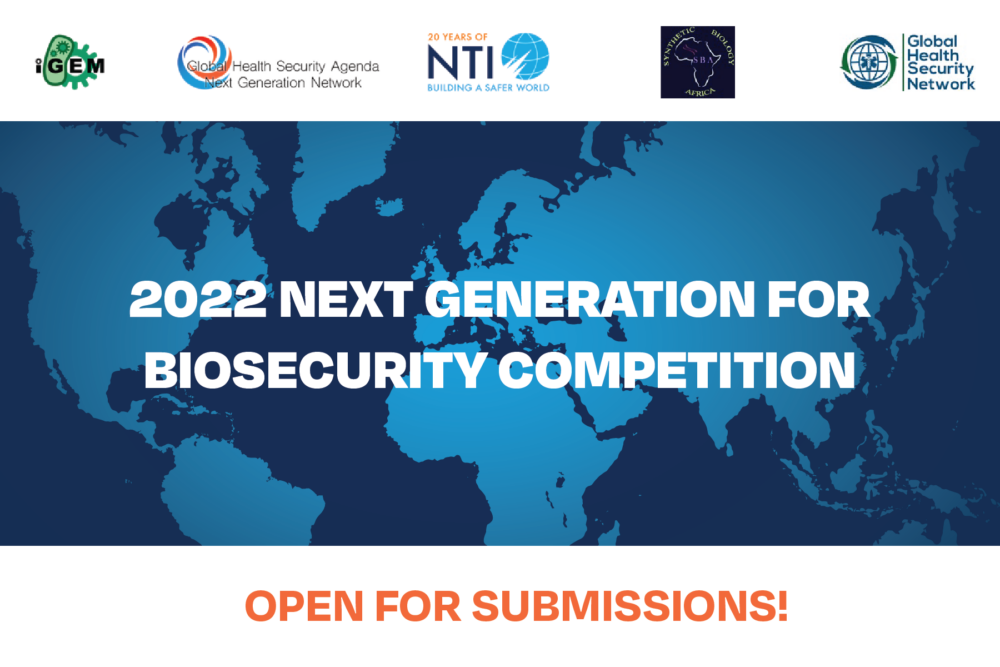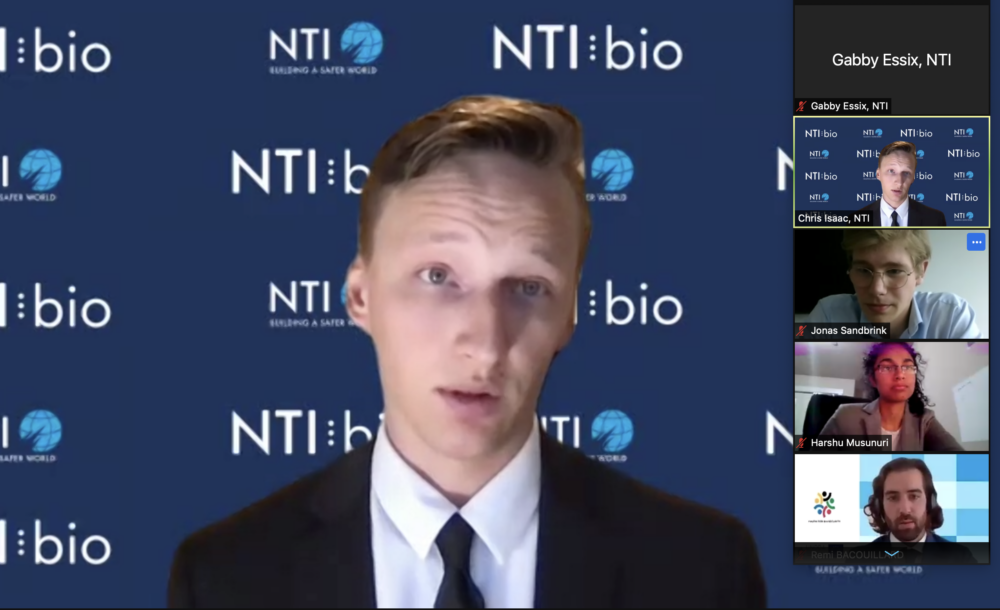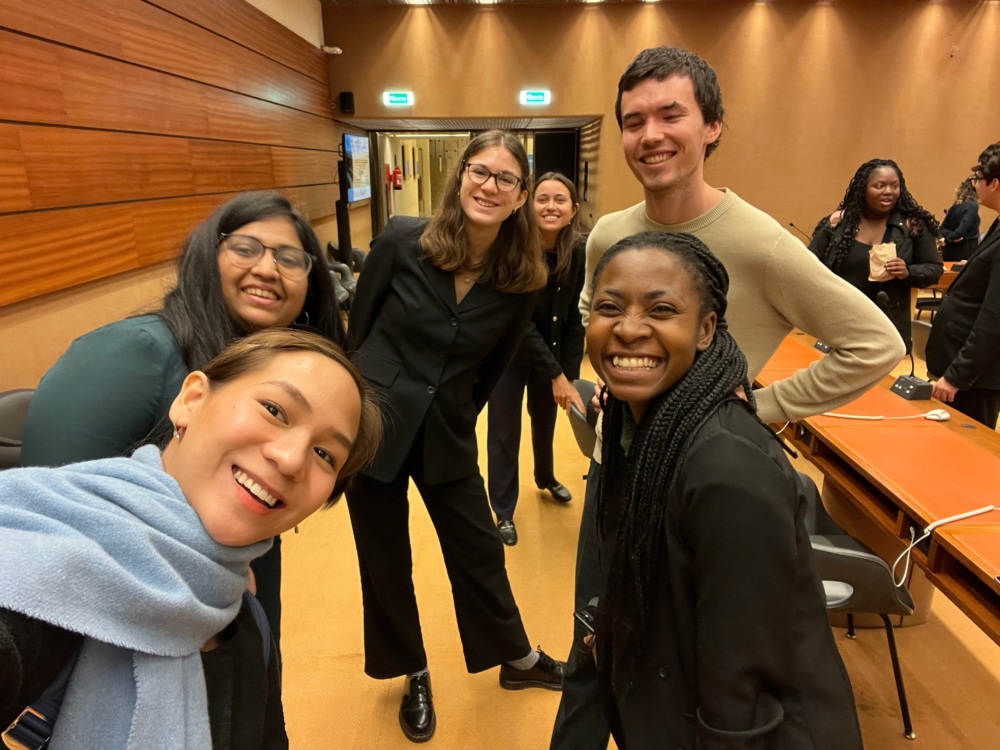
NTI | bio Offers Biosecurity Solutions at the Biological Weapons Convention Review Conference
NTI | bio experts contributed to the 9th Biological Weapons Convention Review Conference in Geneva.
NTI | bio, in partnership with the Next Generation for Global Health Security (GHS) Network (NextGen), the iGEM Foundation, SynBio Africa, and the Global Health Security Network (GHSN), are pleased to launch the Sixth Annual Next Generation for Biosecurity Competition. The competition aims to cultivate the next generation of global leaders in biosecurity. We seek innovative and creative papers focused on verification measures for the Biological Weapons Convention (BWC).
Winners of the Next Generation for Biosecurity Competition will receive:
COMPETITION PROMPT
The COVID-19 pandemic has shown the world how devastating biological events can be ― and raised concerns about our ability to mitigate the potentially catastrophic effects of a future pandemic, especially one that might begin as a deliberate attack by a state actor. This sort of deliberate event is what the Biological Weapons Convention (BWC) was designed to prevent. While the BWC prohibits Member States from developing, producing, acquiring, transferring, stockpiling, or using biological and toxin weapons,[i] it is challenging to determine whether a country is in compliance with the basic provisions of the Convention.[ii]
As of today, the BWC does not have an established system or operational body, like the Organisation for the Prohibition of Chemical Weapons in relation to the Chemical Weapons Convention, to confidently verify treaty compliance with the Convention.[iii], [iv] Treaty verification is essential because it allows for trust amongst governments as scientists from around the world explore critical fields of science that can have dual use concerns. Verification will also lend itself to investigating and identifying treaty non-compliance, thus contributing to biological threats reduction. During the last BWC Meeting of States Parties in November 2021, treaty members, including the United States, promoted the need to strengthen implementation of the Convention and enhance assurance of compliance.[v] Actions to do so can be advanced by revisiting innovative methods for verification. This is a timely issue with the upcoming Ninth Review Conference of the BWC set to begin in August 2022.
Given this background, Next Generation for Biosecurity Competition applicants are requested to tailor their submission to address the following question:
How can the global community leverage the tools of modern science to develop an effective and politically acceptable verification protocol to strengthen the Biological Weapons Convention?
Submissions should:
ELIGIBILITY
SUBMISSION REQUIREMENTS
DEADLINE
Submission deadline is April 18, 2022 at 11:59PM ET. Submissions should be sent to [email protected]. Winners will be announced in June 2022.
NEED A TEAM?
Participants can find teammates by:
COMPETITION GOALS
The Next Generation for Biosecurity Competition seeks to:
Watch our virtual panel featuring an overview of the 2022 Next Generation for Biosecurity Competition and a discussion moderated by a former winner of the competition with experts on this year’s prompt here.
ABOUT THE SPONSORS
NTI is a nonprofit, nopartisan global security organization focused on reducing nuclear and biological threats imperiling humanity. NTI has addressed biosecurity issues since our founding in 2001. NTI | bio is developing new initiatives to curb global catastrophic biological risks, catalyze international biosecurity norms and innovation, enhance biosurveillance for emerging threats, and advocate for measurable biosecurity commitments as an integral component of the Global Health Security Agenda (GHSA).
The Next Generation Global Health Security (GHS) Network engages and facilitates contributions by emerging scholars, scientists, and professionals from government and non-governmental institutions to the Global Health Security Agenda (GHSA) and other global health security projects. Through its mission, the Next Generation Global Health Security Network promotes the values of inclusion, collaboration, education, innovation, and participation to approach and overcome the biggest challenges facing the health security fields today.
The iGEM Foundation is an independent, non-profit organization dedicated to the advancement of synthetic biology, education and competition, and the development of an open community and collaboration. This is done by fostering an open, cooperative community and friendly competition. iGEM is unique in our comprehensive and thorough approach to synthetic biology. With our world class safety and security and human practices programs, we lead the field by fostering an environment of mindful and responsible work.
Synbio Africa is a forum for researchers, students, citizen scientists, policy makers and the public at large to convene and develop successful pathways for the propagation of synthetic biology technologies, products and services throughout Africa.
The Global Health Security Network (GHSN) is a multidisciplinary professional association dedicated to facilitating evidence- informed policy for the detection, prevention and control of infectious disease threats, irrespective of origin or source. GHSN was created to provide a space where global health academics, scientists and policy-makers from across multiple sectors and around the world have a platform to share their thoughts, ideas, research and innovations with other professionals.
[i] https://www.un.org/disarmament/biological-weapons/
[ii] Lentzos, Filippa. 2019. “Compliance and Enforcement in the Biological Weapons Regime.” WMDCE Series No. 4. Geneva, Switzerland: UNIDIR. https://doi.org/10.37559/WMD/19/WMDCE4
[iii] https://www.un.org/disarmament/wmd/secretary-general-mechanism/
[iv] https://www.brookings.edu/blog/order-from-chaos/2017/09/06/the-biological-weapons-convention-at-a-crossroad/
[v] https://documents.unoda.org/wp-content/uploads/2021/11/US-FINAL-updated.pdf
Sign up for our newsletter to get the latest on nuclear and biological threats.
NTI | bio experts contributed to the 9th Biological Weapons Convention Review Conference in Geneva.
The side event was co-hosted with organizations developing young talent in the biosecurity space:
NTI | bio will bring a 2024 Next Generation Biosecurity Delegation of early-career professionals to the Biological Weapons Convention (BWC) meetings from August 19 – 23.


